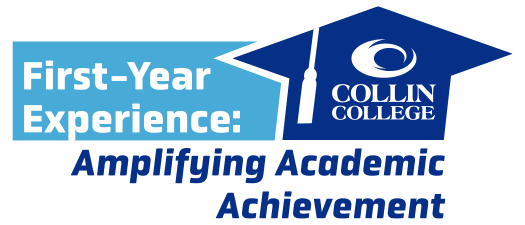
First-Year Experience: Amplifying Academic Achievement
The Quality Enhancement Plan (QEP) is a key component of the reaffirmation of accreditation process required by the Southern Association of Colleges and Schools - Commission on Colleges (SACSCOC). In conjunction with the 2025 reaffirmation process, Collin College's QEP topic is the first-year experience.
The QEP envisions a Collin College that fosters academic success among first-year students from all backgrounds, demographics, statuses, and histories. The QEP also envisions a Collin College that is proactively engaged in providing opportunities for first-year students in traditionally underserved populations to achieve short, medium, and long-term academic goals. To that end, the mission of the 2025-2030 QEP is to identify, develop, and implement student programming and initiatives to help FTIC students transition successfully into college life. The mission includes the use of Collin College data and higher education literature to target specific populations for whom programs and initiatives are tailored and assessed for effectiveness.
The main purpose of the 2025-2030 QEP is to improve FTIC student academic success and persistence through students’ first year by assisting in their successful transition to college life. Goals and objectives towards realizing this purpose are:
- Goal 1: Improve the first-year experience of FTIC students across the district such that
by 2030, FTIC persistence rates increase by at least 5%.
- Objective 1: Revise pre-term orientation in accordance with best practices.
- Objective 2: Require a First-Year Seminar course for FTIC students across the district who are TSI not-college-ready. (Revise and restructure Collin’s EDUC 1300/1100, Learning Frameworks, to act as an FTIC first-year seminar.)
- Objective 3: Identify and implement an early alert system.
- Goal 2: Introduce FYE programs and initiatives to specifically target underserved and male
populations such that by 2030, their persistence rates increase by at least 5%.
- Objective 4: Establish and maintain a centralized division/department for first-year student initiatives.
- Objective 5: Implement targeted intervention programs, including engagement, mentorship, and leadership programs.
- Goal 3: Reduce first-year academic success gaps between underserved FTIC students and the
general FTIC population by at least 5%.
- Objective 6: Implement FTIC co-enrolled courses in connection with the first-year seminar and the first developmental level of integrated reading and writing and math.
- Objective 7: Increase students’ use of formal academic support systems.


